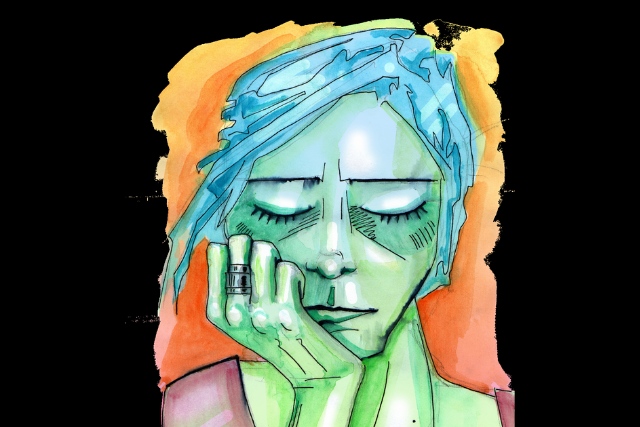
“I am bent, but not broken. I am scarred, but not disfigured. I am sad, but not hopeless. I am tired, but not powerless. I am angry, but not bitter. I am depressed, but not giving up.” ~Unknown
Depression and anxiety. Two words we hear often, but unless we have actually lived with them, we cannot come close to understanding the tremendous impact they can have on one’s quality of life.
Depression and anxiety can make people feel as if they are worthless and better off dead. What a horrible plague. But it is 100% possible to tame these two demons and live a happy, optimistic life that is full of wonder, gratitude, and contentment.
I have lived with the twin tornado for as long as I can remember (since around the start of secondary school), and it’s been a battle of trying to find things to help me to live a good life—one in which I don’t constantly feel a knot in my stomach and a numbness toward living.
When you tell your doctor you’re struggling with depression and/or anxiety, they usually suggest taking medication. This approach can work for many people and is a viable temporary option; however, what happens when the medications don’t work? What happens if the medication turns you into a walking zombie—numb, passive, and cold?
That was my experience. Fortunately, I had enough self-awareness to realize that I wasn’t living; I was just surviving.
There has to be another way, right? That is the question I asked myself night after night. Luckily, my interest in self-development and self-help led me to a few alternative options for healing, many of which sounded promising and were very effective.
I stumbled across the work of Anthony Robbins, which really blew my mind. Many of his NLP ideas were great, ideas such as reframing the way one perceives a problem, creating a radical change in one’s physiology (posture, breathing rate, facial expressions, etc.), and changing the images in our head as well as the story we tell ourselves when we get depressed or anxious.
I found this new information exciting and put it into practice straight away. Sure enough, I started to become more socially confident and began feeling more comfortable in myself.
Much of the change in my life came about because now I had tools that I knew could take the edge off my depression and anxiety whenever they cropped up.
These psychological tools continued to work time and time again; plus, I knew just how effective they were, so my self-belief improved.
Before long I started training in martial arts and kickboxing, began attending public speaking classes, and also landed myself a girlfriend. These were feats that had seemed daunting, intimidating, and impossible back when I didn’t have a handle on my depression and anxiety.
I want you to know that if you are suffering right now, things can and will get better.
Many of you are likely reading this article to get the ‘answers’ for defeating anxiety and depression in order to help yourself escape a dark place. Many of you are reading this in order to help a friend or loved one do the same. Some of you might be reading out of curiosity.
For those of you who are struggling right now, you might feel pessimistic about my advice, and that’s totally understandable. I ask that you dedicate a week to trying some of my suggestions and make a point of noting your mood throughout the day; you’ll see how these things will help you, again and again.
For those of you reading this who aren’t struggling too much but are looking for suggestions to promote happiness and well-being, or simply to fight off a bad mood when one arises, I also urge you to keep reading, as well as to take on any of my suggestions that may suit you.
Before I share the main things that have helped me manage my depression and anxiety, I want to let you know that I still have bad moods (I am human), I still get nervous (I am still human), and that life is not a fairy tale.
This being said, I have made tremendous leaps forward and feel in control of my depression and anxiety. These two demons are still in my life, but now I control them and not the other way around.
Okay, so let’s take a look at some of the things that helped me—things that can help you too.
Practical Steps for Managing Depression and Anxiety
Meditate.
This is easily the most overlooked and simple practice that can make a world of difference in improving the quality of your life.
It is so frustrating to see people who know all of the vast benefits meditation has to offer and yet do not meditate. Due to the fact that it seems too simple to be truly helpful, many people never start a practice. (Rant over!) I lovingly suggest you make it a daily habit, as it can help you train your brain to respond differently to negative thoughts and stressful situations.
There are many different forms of meditation (including walking meditation, so “having no time” cannot be an excuse). I suggest you experiment and find one that suits you.
If you’re suffering with depression and/or anxiety, I recommend Loving Kindness Meditation. (Google it—you’ll find lots of articles explaining how it’s done).
Start with a short practice to ensure that you build the habit of practicing daily. If you can only manage three minutes a day, then perform three minutes of meditation per day. If you feel as if you can do more, then go right ahead. The goal is to eventually practice twenty minutes a day.
Ask better quality questions.
Thinking is nothing more than the process of asking and answering questions in our heads. We need to develop the habit of asking ourselves more empowering questions whenever we fall into a downward spiral.
If we ask a question such as “Why do I always fail?” or, if we make statements to ourselves like “Life is pointless,” we can’t be surprised that we feel bad. Imagine somebody following you around all day pointing out the negatives in you and in life; your self-talk can have the same damaging impact on you and your emotions.
Whenever I felt as if the cycle of depression was coming on strong, I would take the time to answer the following questions in as logical as manner as possible. Why logical? Because logical thinking negates irrational thinking and helps stop the spiral of depression (or anxiety) from getting worse.
It’s easier said than done to be purely logical in our thinking when we’re depressed or anxious; it’s still worth a shot, though, because it can help.
- What is the issue that is upsetting me? (Be factual here—what do you know for sure?)
- What can I learn from this problem/situation?
- What is one good thing about this? How can this be an opportunity?
- What is great about this situation?
- What action can I take right now to better the situation or how I feel?
- What is the worst-case scenario here? How can I handle this should it become a reality?
- What am I grateful for in my life right now?
- What am I excited about or looking forward to right now?
- Who do I love and who loves me?
These questions can get us to acknowledge all of the good in our lives and helps us to get away from a downward negative spiral of emotions when we encounter situations that might otherwise trigger depression and anxiety.
Practice acceptance.
Many people have different ideas of how we can truly accept the obstacles and struggles that life throws us; they all involve non-resistance to the present moment (how things are in your life right now).
I practice acceptance by stepping into the body, becoming present, and identifying how depression and anxiety feel. This does not mean how we think our depression and anxiety feel but how it actually feels.
Is it a tension, a tingling, a pulsing? It usually feels like a knot in my stomach. I often feel my heart beating stronger and stronger, while I also experience a slight tingling or even shaking in my legs.
Where do all of these sensations reside? Are they in your chest, stomach, or throat? How about all three?
I have found that depression usually occurs in the mind first—our thinking is what gets us depressed. Accepting how your body feels in the moment takes your attention out of your head, giving you a much-needed break from the relentless thoughts that depression and anxiety bring forth.
Try not to get roped back in to wrestling with your thoughts. Simply acknowledge them and let them drift in and out, or even dissipate. This kind of acceptance is likened to a mindfulness approach—again, very simple but extremely effective.
Side note: Another great way to get outside of your head is to help somebody else. Spend some time helping somebody feel better, sleep better, live better, and notice how this makes you feel.
Tell people how you feel.
Sometimes it can feel as if those around us, whether family, friends, or colleagues, don’t truly understand how we feel. You might think people can sympathize but cannot empathize, but more people struggle with anxiety and depression than you may realize.
When we tell people how we truly feel it’s as if a weight has been lifted off of our shoulders, and also, we are more likely to receive their support and understanding, which makes our lives a little bit easier.
I understand how difficult it can be to let people know that you suffer with depression and anxiety, especially since we have been taught to ‘soldier on’ and put on a happy front to the outside world. But believe me, there is nothing embarrassing about admitting that we struggle. In fact, quite the opposite is true; it’s admirable because it takes a huge amount of courage to do so.
Try telling somebody close to you how you feel and ask for their support and understanding. If you are really struggling and even battling suicidal thoughts then this is an even more important action step for you; I know it is extremely difficult but I promise you will not regret it.
Give yourself time to be happy each day.
This may seem too simple and perhaps even patronizing, but stay with me while I explain what I mean. Actually, I mean two things:
First of all, we must be kind to ourselves and allow time for relaxation and enjoyment. Seems obvious, but many people (including myself) find ourselves feeling guilty or lost in thought during times in which we ought to be relaxing and having fun.
Take an hour each day to do something you truly enjoy, something that makes you lose track of time and feel joyful and vibrant.
One element of depression is a lack of enjoyment in activities, so you may need to think hard about what you can do each day that will bring a smile to your face; but I’m certain there is something!
You could go for a walk in nature, read a book, watch your favorite television program, talk to a friend—the options are truly limitless.
Now, if you struggle with both depression and anxiety (like myself), you may find that many activities you truly enjoy involve being alone. This is perfectly fine, but I urge you to push yourself at least once a week to spend time with close friends or loved ones; you will likely see an improvement in your mood and increase in your energy once you do so.
The other element of giving yourself time to be happy is slightly different from what you may have heard before. Sometimes we forget that being happy can actually require work! In fact, most of the time we need to exert self-discipline in order to do those things that we know are good for us, such as eating a healthy, balanced meal and taking part in regular exercise or meditation.
Set aside ten to twenty minutes a day to write in a journal. This is a great way to vent your thoughts, feelings, frustrations, fears, and dreams. A journal can give you more clarity and objectivity so you get out of your own head and escape your sometimes-malicious thoughts.
I personally like to journal for five to ten minutes each morning and then again every evening. I noticed a world of difference to my mood once I became consistent, especially with regards to my anxiety.
If you don’t know what to write or how to structure your journaling sessions, then start with the basics: how you feel, what you have been doing, anything on your mind, anything you are worrying about, etc.
Try and write at least one thing each session that you are grateful for or looking forward to, as this will likely lift your mood. Remember that this will be your journal; you are free to do with it what you will. Give it a go yourself and see how you get on.
—
A quick word before I leave you: You might not experience any benefits immediately after you begin implementing these practices, so it’s important to be patient and to keep moving forward.
As I already mentioned, applying some of what you may have learned here will require discipline, but I know that you can do it.
Also, remember to be kind to yourself. Don’t beat yourself up for feeling down or anxious or uncomfortable. We all have bad days, especially when we are dealing with the twin terrors of depression and anxiety. Be kind to yourself. Be kind to others.
I wish you all the best, and I sincerely hope that this article has been of benefit to you.
*This post represents one person’s personal experience and advice. If you’re struggling with depression and nothing seems to help, you may want to contact a professional.
About George Ripley
George Ripley is a mental health adviser and personal development enthusiast. He wants to change the world one person at a time and hopes to see people change for the better by overcoming mental health struggles. You can find his books on amazon or follow him on Instagram at georgeripleywellbeing.













 Though I run this site, it is not mine. It's ours. It's not about me. It's about us. Your stories and your wisdom are just as meaningful as mine.
Though I run this site, it is not mine. It's ours. It's not about me. It's about us. Your stories and your wisdom are just as meaningful as mine. 